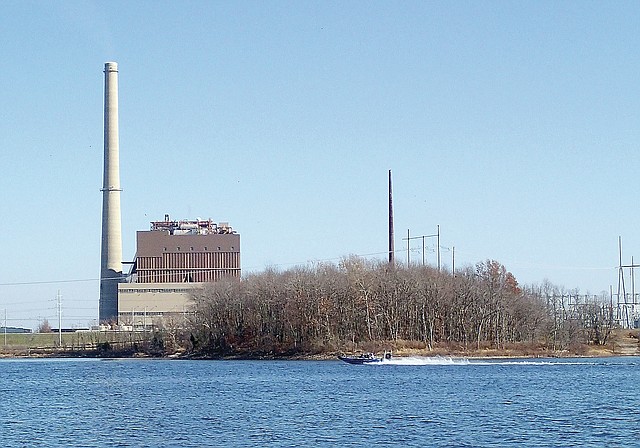Northwest Arkansas Relies On Coal And Gas, Few Renewables
FILE PHOTO FLIP PUTTHOFF The Flint Creek Power Plant looms large Dec. 3 at Swepco Lake and keeps the water warm during winter.
Tuesday, April 22, 2014
The warnings against "business as usual" in generating electricity get louder every year, but coal and natural gas provide most of Northwest Arkansas' power and likely will be for some time.
The United Nations' Intergovernmental Panel on Climate Change sounded alarms this year with three reports, each written and vetted by hundreds of scientists.
At A Glance
Northwest Arkansas Power By Source
• Coal: 65 percent
• Natural gas: 21 percent
• Hydropower: 5 percent
• Wind: 5 percent
• Nuclear and other: 4 percent
Source: Staff Report
Humans are releasing enough carbon dioxide from burning coal and oil to warm the globe, and the result is rising sea levels and damaged crops and species worldwide, according to the panel. To lessen this harm, humanity must adjust its power sources, according to the panel.
As of today, the country's 44th Earth Day, Washington and Benton counties get about one-tenth of their electricity from renewable sources like water and wind, according to utility companies that cover the area. Nearly all of the rest comes from fossil fuels.
There appears to be little momentum to change the balance, experts said, because the system is reliable and affordable. Arkansas energy costs are lower than all but six states, according to the U.S. Energy Information Administration.
"This is the problem. You have an inertia: If it's not broken, don't fix it," said Juan Carlos Balda, an electrical engineering professor and a member of the University of Arkansas sustainable energy systems research group. "Do we need to have other fuels? The answer is yes."
Nature can survive whatever humans do, Balda added, but it's unclear humanity can say the same.
"The problem is not Mother Earth," he said. "The problem is the human race."
The Energy Picture
Three utilities provide power from across Arkansas, Oklahoma and other states for 180,000 customers in Washington and Benton counties.
Two are part of the Arkansas Electric Cooperative Corp., an umbrella organization for the state's 17 electric co-ops. Carroll Electric mainly covers Benton County, while Ozarks Electric takes over in Washington County.
The smaller co-ops generally draw power from the state network, with roughly 90 percent of those electrons coming from fossil fuels. Water energy from Beaver Lake's two turbines and wind energy from Kansas and Oklahoma round out the mix.
"The electrons that are going to my home are a mix of the generation from everything that we have," said Nancy Plagge, Carroll spokeswoman. "When you throw it in that bucket, you can't tell (the difference)."
The Southwestern Electric Power Co. covers about 70,000 customers. It's power mix is similar to the state's overall, with about half coming from coal and 10 percent from wind, water and other renewable sources.
Swepco and the co-ops split power from the Flint Creek Power Plant in Gentry, which hums 24-7 to provide constant baseload power.
Swepco also operates a natural gas plant in Tontitown. Representatives from all three utilities said they were resisting the natural gas boom because its price can change quickly. Last winter's cold sent prices up about 50 percent.
Oklahoma Gas and Electric provides power for a small number of customers in Washington County. Empire District Electric Co. does the same for some in Benton County.
Rise Of Renewables
Renewable use is increasing nationwide -- wind and solar have jumped twenty-fold in the past decade, according to the energy administration. But some say the U.S. can do better than 10 percent renewable.
A 2010 report from the Institute for Local Self-Reliance, a Minneapolis-based advocacy group, found wind and solar in Arkansas could generate more than 80 percent of the state's needs.
The utilities use net metering, which allows customers with solar panels, wind mills, even a water wheel to use that power and sell the extra back to the utility. More than 100 co-op customers do this.
Arkansas is one of a dozen states without an official renewable energy mandate or goal. It also stopped offering a 30 percent solar panel rebate in 2012. Solar remains about a third more expensive than coal.
"Obviously we want to try to limit our greenhouse gas emissions as much as we can, but not at the expense of killing our economy and not at the expense of ruining our standard of living," said Alan Mantooth, a University of Arkansas electrical engineering professor. "We can do this in a measured sort of way, with a plan."
Mantooth and Balda both pointed to micro-grids, also called distributed generation. Instead of massive power systems that are vulnerable to disasters, smaller plants would generate power for campuses, neighborhoods and towns.
Home solar panels and other renewable sources are more easily folded into this mix, Balda said. Smaller grids could be eco-friendly in another way: cutting down on the 7 percent of electricity that's lost in miles of wire.
"Just don't leave renewables out of that equation," Mantooth said.
Utilities have no firm plans to make any sweeping changes.
"We'll continue to look at those options," said Rob Roedel with the Arkansas co-op, echoing his counterparts. "If it's economically feasible and beneficial to our members, we will adapt that source. We're constantly evaluating technologies."
Three legislators for Northwest Arkansas sit on the General Assembly's Joint Energy Committee, which decides if energy-related proposals get a vote. All three affirmed their support for coal and unwillingness to rattle the system.
"We will run out of oil, we'll run out of gas, we'll run out of coal -- we've got to have alternatives to turn to in the future," said Rep. Dan Douglas, R-Bentonville, echoing fellow Republicans Rep. Micah Neal of Springdale and Sen. Jim Hendren of Gravette. "But at this time, we still have to keep our economy running and growing."
NW News on 04/22/2014
